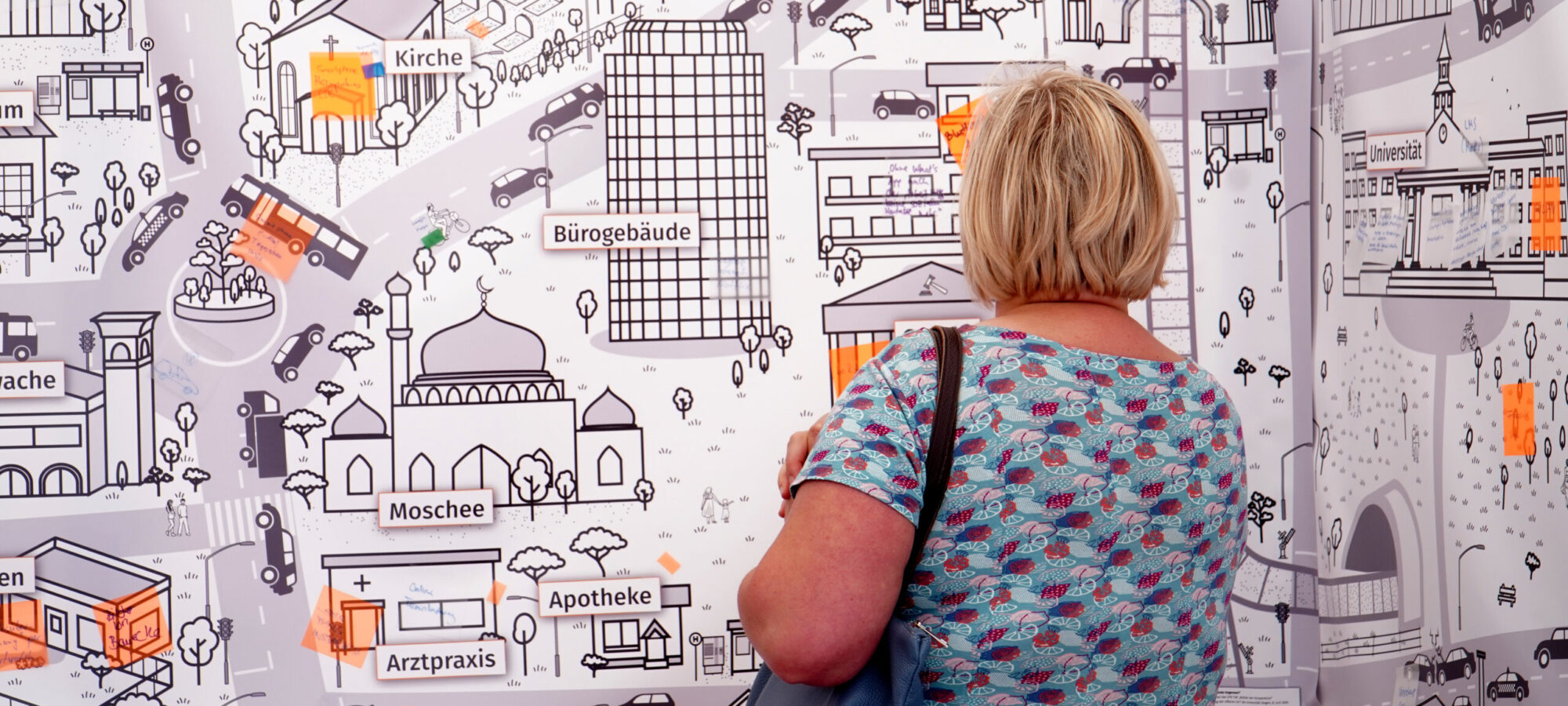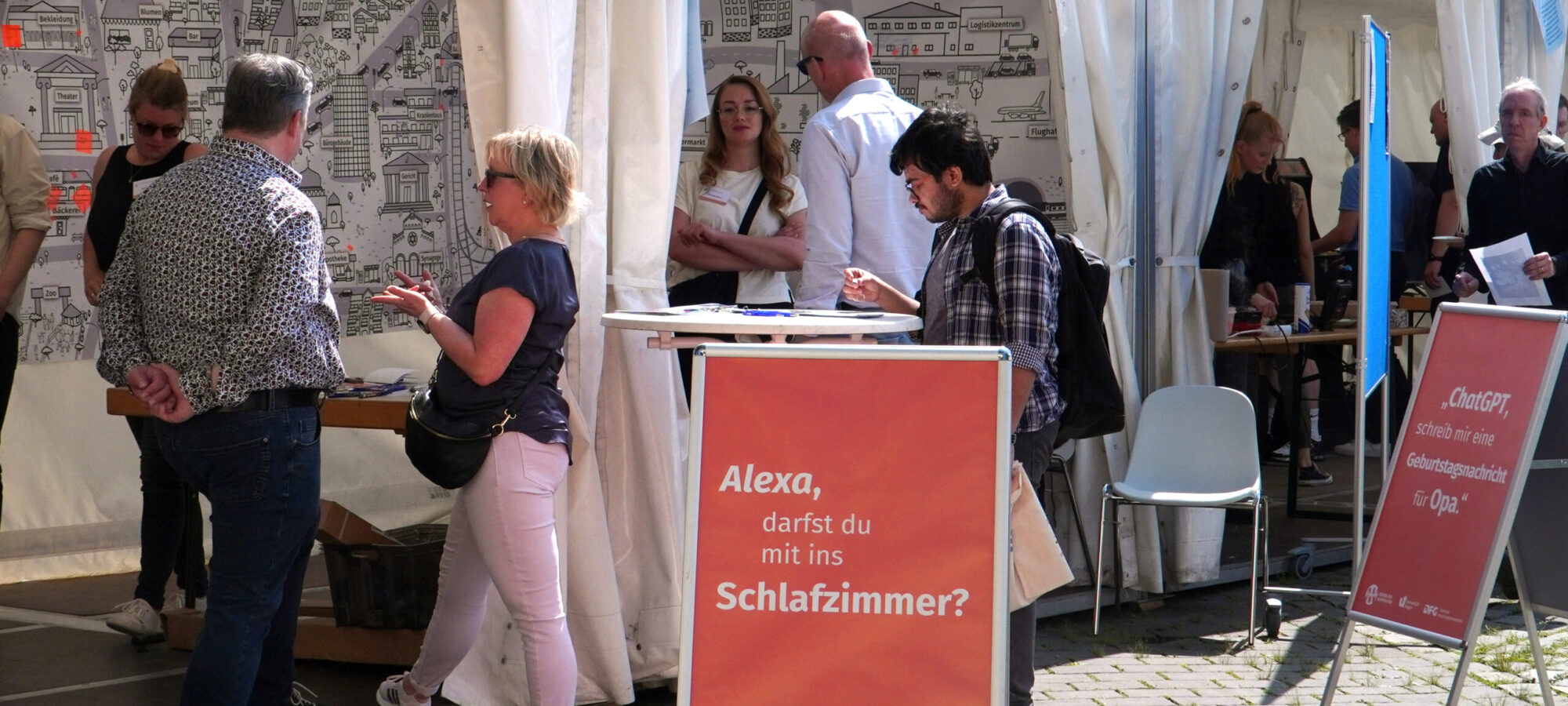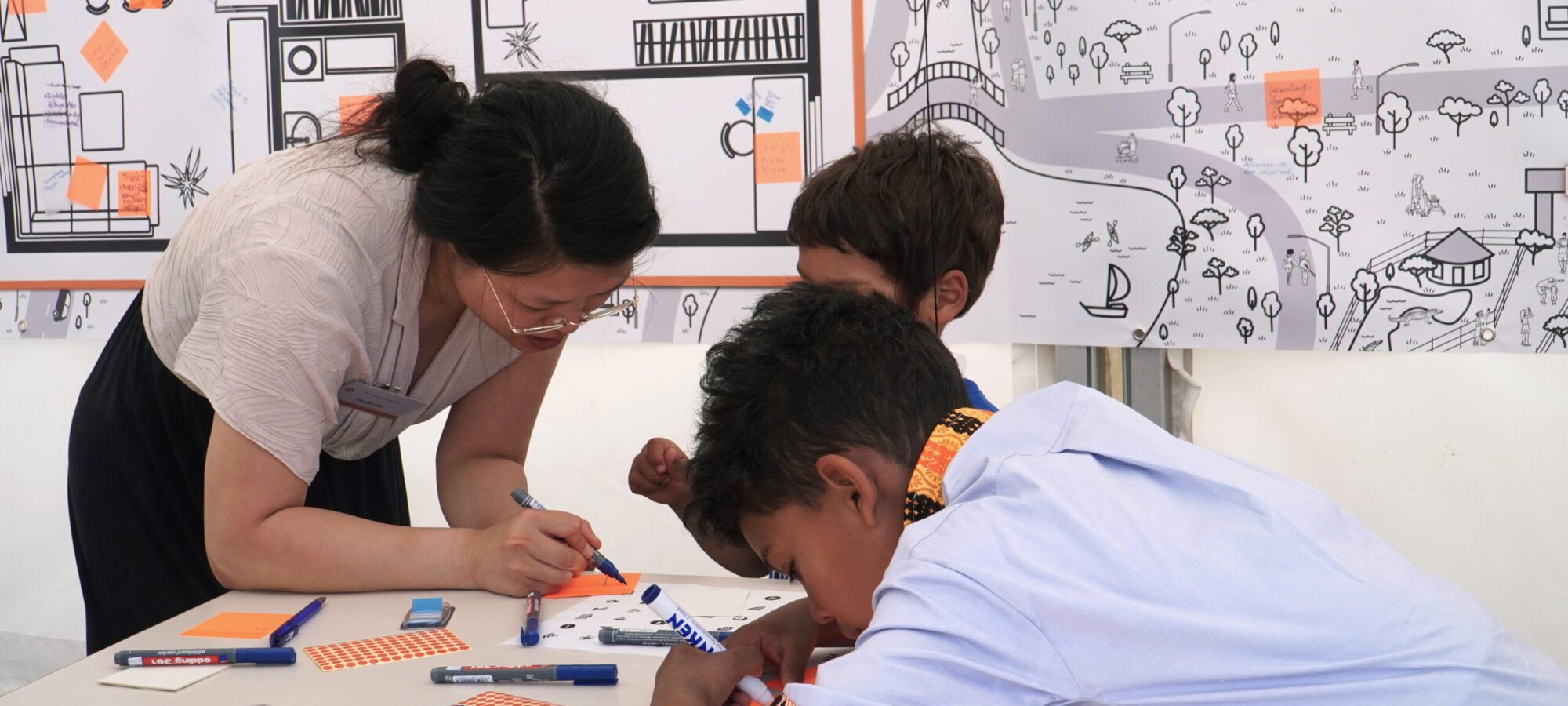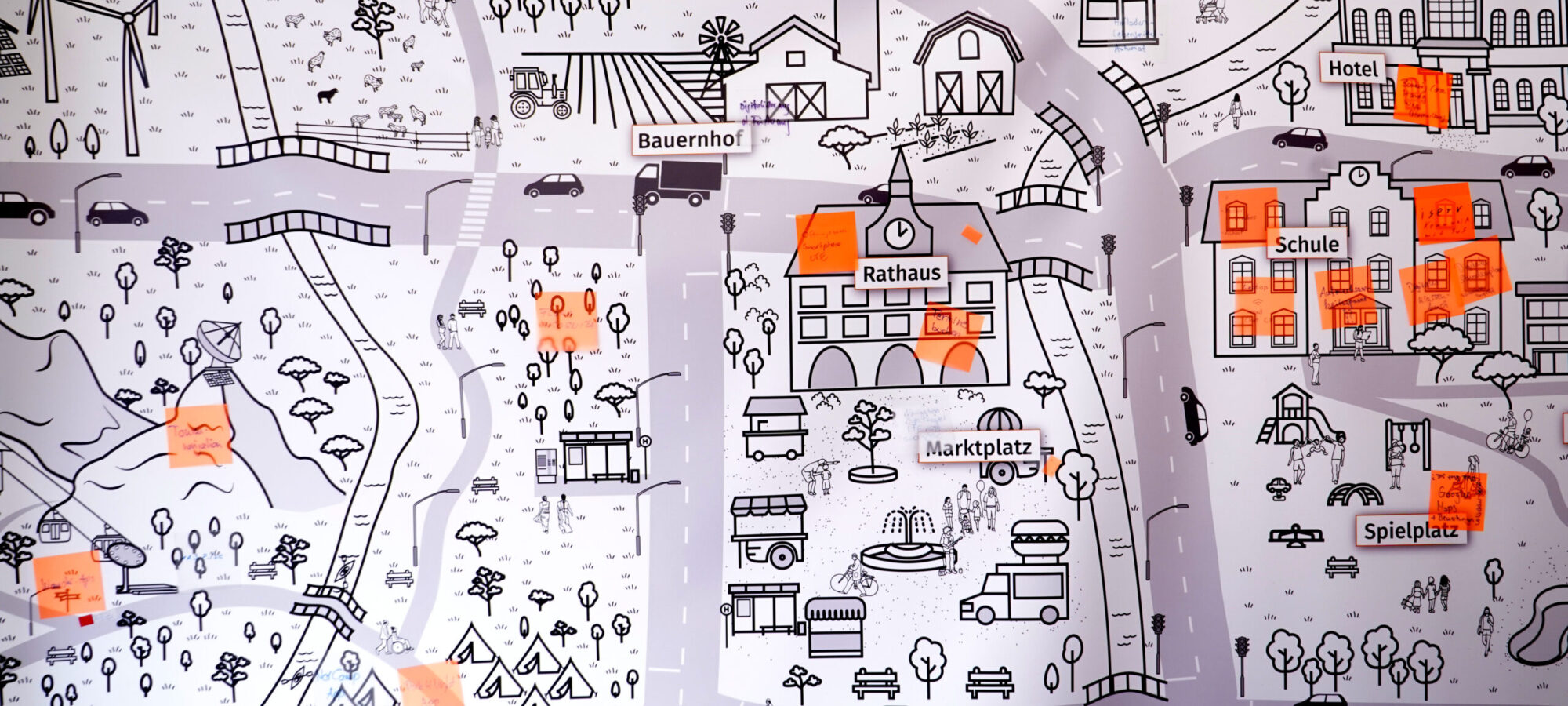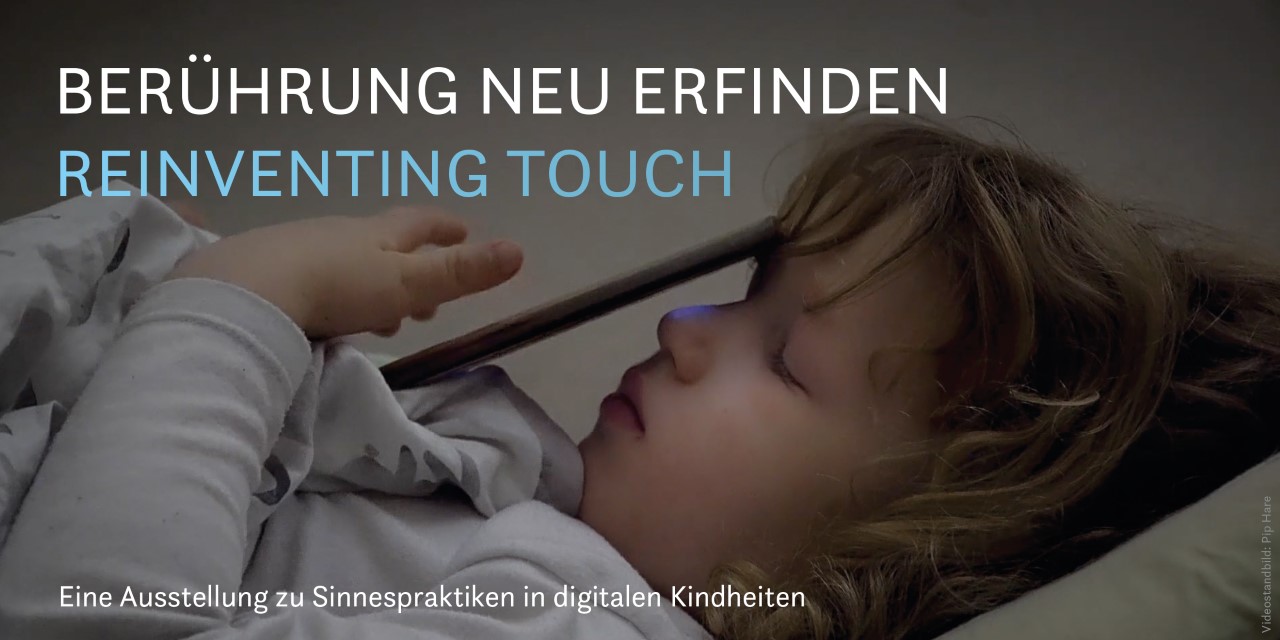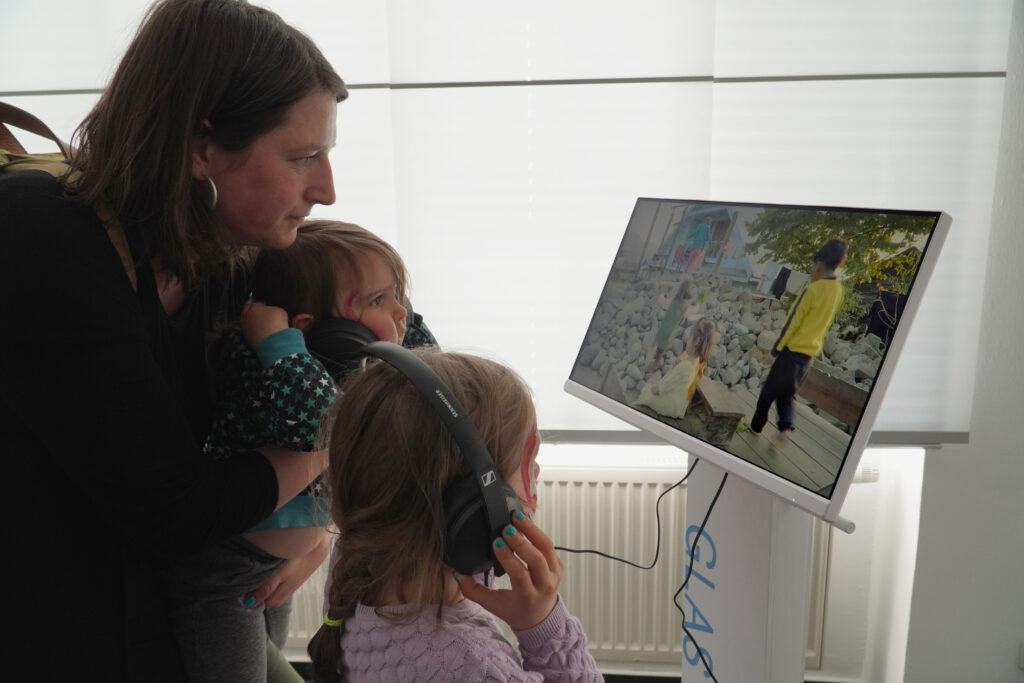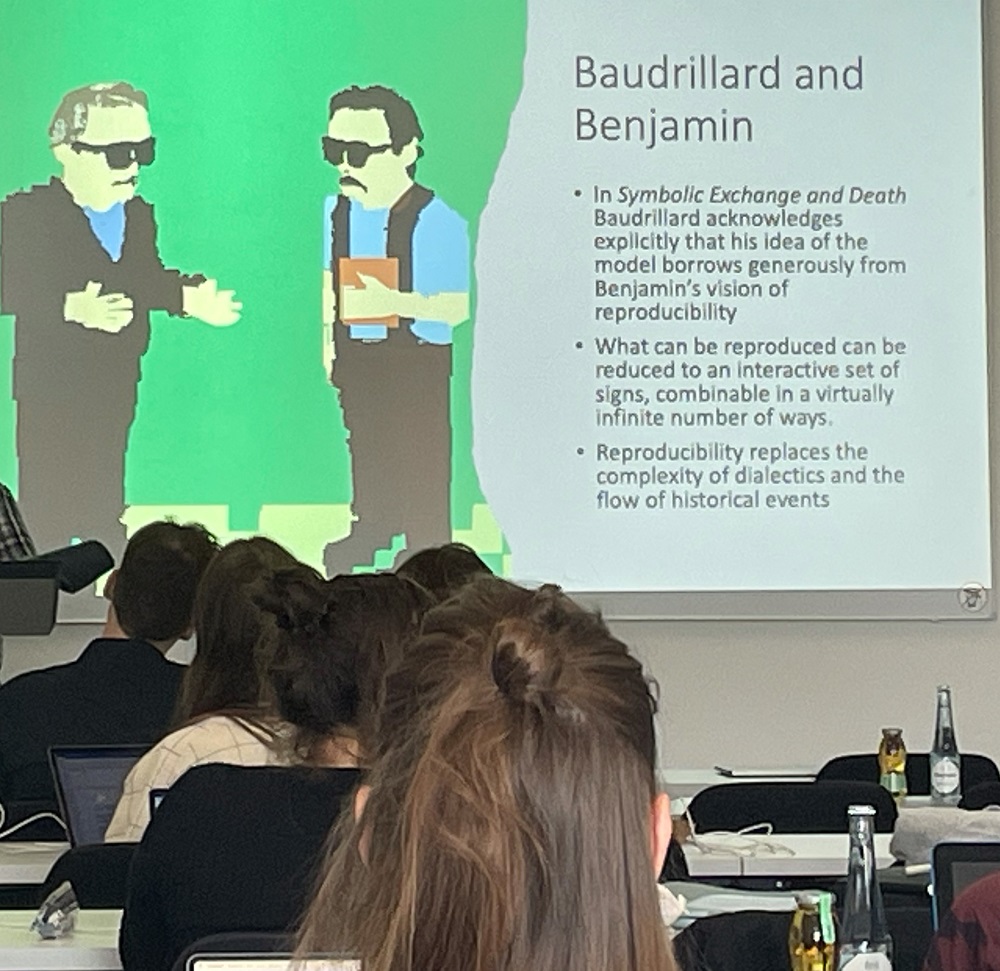News

Scaling Sensing – Sensing Publics: Landscapes and Borders, Homes and Bodies
We are excited to invite you to the CRC Annual Conference 2024, taking place from November 13-15, 2024, at Uni Siegen, Obergraben 25, US-S 001/002. Organized by the Collaborative Research Center (SFB 1187) – Media of Cooperation. This year’s conference focuses on Scaling Sensing – Sensing Publics: Landscapes, Borders, Homes, and Bodies and is generously funded by the Deutsche Forschungsgemeinschaft (DFG).
About the Conference
This event is free and open to all, with a special invitation to early career researchers interested in engaging with leading experts and innovative research on the role of sensing practices and technologies in shaping public and private life.
The conference will offer a platform for interdisciplinary perspectives on how sensing practices influence environments, borders, domestic spaces, and the human body. Sensor technologies have rapidly changed the way we understand and interact with the world, influencing fields as diverse as the natural environment, urban planning, healthcare, and privacy.
Key themes and panel sessions:
- Sensing Landscapes: how sensing practices (human, digital, and non-human) shape the use and understanding of landscapes across diverse ecological and socio-political contexts.How sensing practices (human, digital, and non-human) shape the use and understanding of landscapes across diverse ecological and socio-cultural contexts.
- Sensing Borders: The implications of sensor-based technologies on migration, surveillance, and border control, highlighting their role in security and sociopolitical dynamics.
- Sensing Homes: The growing integration of smart home technologies, focusing on privacy, convenience, and control within domestic environments.
- Sensing Bodies: The intersection of wearable technologies and embodied social interactions, with implications for healthcare, biometric tracking, and social connectivity.
Next to renowned international keynote speakers, each panel will feature experts and researchers from various disciplines who will present case studies and theoretical reflections on interactionsbetween sensing, sensor technologies, and the public sphere.
Highlighted Speakers Include:
- David Howes (Concordia University, Montréal) on Calibrating the Techniques and Technologies of Perception-Action.
- Jürgen Streeck (University of Texas, Austin) on Deeply Sensed Togetherness.
- Maya Avis (Centre for Digital Humanities and Multilateralism) on States of Surveillance in 2024.
- Saadia Mirza (University of Chicago/ Sciences Po, Paris) on Sensing and Classification of Landscapes.
We will also enjoy a special evening of cultural enrichment on Thursday, November 14, with a performance by the Göksel Yilmaz Ensemble. Their music beautifully blends Turkish, Arabic, and Kurdish traditions with jazz and classical influences, promising a memorable night of music and cross-cultural celebration.
Event Details:
- Dates: November 13-15, 2024
- Location: Uni Siegen, Obergraben 25, US-S 001/002
- Time: 9:00 AM – 6:00 PM daily
- Cost: Free of charge
How to Register:
Registration is open until October 20, 2024. To secure your spot, please register here.
Why Attend?
This conference is a unique opportunity for professionals, researchers, and students in fields related to media studies, cultural anthropology, socioinformatics? sensor technology, ethics, urban planning, healthcare, and more. We especially encourage early career researchers to join and benefit from networking and discussions with experts in the field. Whether you’re interested in the impact of technology on privacy, the future of smart cities, or the ethical dilemmas surrounding sensor-based surveillance, there’s something for everyone.
We look forward to welcoming you to an exciting and intellectually stimulating three days of discussions, presentations, and networking.
For more information about the program and detailed schedule, visit our conference website.
Follow us on social media for live updates throughout the event →
#CRC2024 #ScalingSensing #SensingPublics #MediaOfCooperation
Thank you, and we hope to see you there!
The CRC 1187 offered visitors of all ages exciting insights into the everyday world of digital media and the opportunity to reflect on their own digital everyday life with an interactive stand at the “Open University”, hosted by the University of Siegen on June 8.
(© Astrid Vogelpohl 2024, TP B05)
On Saturday, June 8, 2024, the Schlossplatz of the Lower Castle in Siegen was transformed into a lively research laboratory. As part of the annual “Open University”, more than 50 stands and hands-on exhibits offered insights into various aspects of university life. The DFG Collaborative Research Center 1187 Media of Cooperation also presented a fascinating insight into our digital present. Visitors of all ages explored the CRC stand to share their own experiences with smart devices and learn more about the research investigating our digital and cooperative lives.
The centrepiece of the CRC stand was a 12m long tent wall, which was transformed into a colourful map of our digitalized world over the course of the day. Visitors used sticky notes to mark where and how they use smart devices in their everyday lives on an illustrated map of the city and their homes. From children talking about tablets in kindergarten, to students presenting their favorite apps, to pensioners sharing their experiences with digital assistance applications – the diversity of contributions reflected the ubiquity of digital technologies in our lives. CRC researchers used this opportunity to talk to visitors and gain new perspectives on their work.
The CRC 1187 stand was well received, highlighting the growing public interest in research into our digitalized society. The research centre has been studying digital, data-intensive media since 2016. The researchers are investigating how digital technologies shape our everyday lives and how people shape and use them together. The CRC’s work currently focuses on sensor technologies and artificial intelligence and the question of what influence these have on our daily lives and work. At events such as the “Open University”, the CRC aims to make its research relevant to everyday life in direct exchange with the public and at the same time raise awareness of the importance of digital media in our society.
June 27, 2024 14:00-19:00 / June 28, 2024 9:00-13:00
In advance: individual telephone conversation to discuss reference to your own project and materials.
The aim of this master class is to experience the experimental approach of camera ethnography and to try out arranging research (with reference to Wittgenstein) together by referring to the diversity of research fields which will be represented in the workshop. Participants are encouraged to bring some of their own research material to this workshop.
Filming as an epistemic practice
In our everyday use of media, we simply believe that we can capture something with a camera and share it with each other. However, if we assume that the goal of research is to get beyond the state of what is known and seen so far, then we are dealing with epistemic things that are not yet visible at first and therefore cannot just be recorded with a camera. With this consideration, Bina E. Mohn, the founder of camera ethnography, refers to the sociological laboratory studies of the 1980s and 1990s. Starting from a premise of the not (yet) visible marks the departure from strategies of camera use that assume visibility exists a priori. Camera ethnography offers a manageable representation-critical approach based on a situated methodology and can be understood as a continuous reflexive process of working on visibility and seeing. Camera ethnography lends itself particularly well to the study of nonverbal practices and socio-material constellations. Furthermore, camera ethnography is particularly suitable for an adoption of the format “übersichtliche Darstellung” (Wittgenstein): In this context, filmic arrangements serve as an attempt to answer the question of how social practices can be lived, named, and understood here and now, and there and then. For viewers of camera-ethnographic publications, this offers an opportunity to discover unexpected things about the diversity and possibility of social phenomena and practices.
The basic book by Bina E. Mohn „Kamera-Ethnographie. Ethnographische Forschung im Modus des Zeigens. Programmatik und Praxis“ has been published in 2023, is open access and underpins this master class. Important references of the camera-ethnographic approach include Bruno Latour (science-in-the-making), Karin Knorr-Cetina (epistemic cultures), Hans-Jörg Rheinberger (experimental systems), Clifford Geertz (“thick description”), Ludwig Wittgenstein (language games and “übersichtliche Darstellung”), and Karen Barad (agential realism and intra-action).
Requirements for participation
- Experience in ethnographic fieldwork, regardless of the medium
- Readiness to change perspectives and media and to experiment.
Registration for the master class
Contact and registration: wiesemann@erz-wiss.uni-siegen.de
Registration deadline: May 15, 2024. Participation will be bindingly confirmed by the organizers by May 20, 2024. Please briefly answer these questions when registering:
- Which research project am I currently working on and which practices in this field am I particularly interested in?
- What questions do I have about media ethnographic theory and practice?
- Which materials would I like to bring to the master class on camera ethnography?
Bina will be available to make more detailed arrangements with each of you via telephone.
Venue
Campus Lower Castle
US-S 001 / 002
Obergraben 25
Siegen
Herbsttagung der DGS Sektion Soziologie des Körpers und des Sports
in Kooperation mit dem SFB-1187 „Medien der Kooperation“
Universität Siegen, 09. – 10.11.2023
organisiert von Dr. Clemens Eisenmann, P02 “Medien der Praxeologie II: Zur Methodologiegeschichte der AV-Sequenzanalyse”
Körperliche Wahrnehmungen, Praktiken und Handlungen werden zunehmend durch Technologien und digitale Medien vermittelt und in besonderer Weise durch diese (mit-) hervorgebracht. Viele Untersuchungen, die im Zuge der Digitalisierungs- und Mediatisierungsschübe der vergangenen Jahrzehnte und Jahre (pandemiebedingte Formen der digitalen Kommunikation, KI-Systeme als Teil von Entscheidungsprozessen, Chat GPT, neue Sensormedien, datenintensive Umwelten und digitale Infrastrukturen im urbanen oder architektonisch gestalteten Raum, etc.) entstanden sind, zeigten auf, wie Medien, Applikationen oder Hoch-Technologien auf verschiedene Sinne(smodalitäten) einwirken und infolgedessen Körperlichkeit(en) verändern, neujustieren oder auch irritieren. Dabei wird vielfach deutlich, dass bereits ohnehin marginalisierte Personengruppen und ihre Interaktions- und Wissensformen im Alltag durch die Produktion und Handhabung von neuen Digitaltechnologien nicht nur gestärkt, sondern in der Tendenz weiterhin – und z.T. auf neue Weise – ausgehend von ihrer Körperlichkeit ausgegrenzt, stigmatisiert und diskriminiert werden. „Diverse Körperlichkeit(en)“ soll(en) in diesem Zusammenhang auf der Herbsttagung als eine gemeinsame, möglichst weite Heuristik für körpersoziologische Perspektiven dienen, die die mithin digitale und technisch induzierte Konstruktion von körperlichen Differenzen und Diversität im Zusammenhang mit historischen und neu entstehenden sozialen Ungleichheiten, Vulnerabilitäten und Exklusionsmechanismen fassen können.
Ein aufschlussreicher Gegenstand für die Erforschung der gegenwärtigen Wechselwirkungen von diversen Körperlichkeiten und digitalen Medien bildet die Schnittstelle verkörperter Sensormedien. Darunter lassen sich zunächst all jene Medien und Technologien fassen, die körperliche Sinne in ihrer Wirk- und Wahrnehmungsqualität erweitern, vermitteln oder konstituieren. Dabei stellt sich die übergreifende Frage, wie Sensormedien diverse Körperlichkeiten herausfordern, wenn Körper z.T. ermächtigt, aber auch mit neuen – häufig nicht-intendierten – Vulnerabilitäten, Effekten, Reibungen, Problemen und Folgen konfrontiert oder gänzlich exkludiert werden. Klärungsbedürftig ist in dem Zusammenhang nicht nur, wie sich Sensormedien in Körper einschreiben und wie sie alltäglich verkörpert werden, sondern bereits vorgeschaltet, welche z.T. standardisierten Körpervorstellungen und Körpertechniken, bzw. Praktiken und spezifische Wissensformen in Sensormedien inskribiert sind. Im situierten und multisensorischen Zusammenspiel von dem, was gesehen, getastet, geschmeckt, gehört oder in der Bewegung erfahren werden kann, stellen sich somit die Fragen, wie sowohl Körper als auch Sensormedien in Praktiken, Handlungen und Interaktionen hervorgebracht werden und wie Wahrnehmungen durch Technologien, Erfahrung und Wissen vermittelt und sozial konstituiert werden.
Diskutieren möchten wir folglich Fragestellungen nach der (sozialen) Wahrnehmung und alltäglichen praktischen Verkörperung von in Körpern, Alltagsgegenständen, Technologien und urbanen Infrastrukturen oder Architekturen verbauten Sensoren. Ein Zugang zu Sensormedien lässt sich aus einer körpersoziologischen Perspektive – auch im Anschluss an Phänomenologie, (Feminist) STS, Sozial- und Kulturanthropologie, Human Computer Design oder Critical Data Studies – fruchtbar an die immer noch aktuellen Diskussionen um die Bedeutung der sozialen, kulturellen und materiellen Dimension von Sinnlichkeit anschließen. Diskussionen, die mit Perspektiven auf Einzel-Sinne und deren Hierarchisierung brechen und mit Multisensorialität das komplexe, historische und soziale Zusammenspiel zum Gegenstand machen. Einen weiteren Zugang bilden aktuelle Debatten um soziale Diskriminierung – wie sie bspw. auch in sozialen Bewegungen, wie LGBTIQ+, PoC oder Crip-Movement virulent werden – sowie situierte und intersektionale Perspektiven, die u. a. darauf abzielen, körperliche Differenzen und damit einhergehende Differenzierungsprozesse theoretisch wie empirisch fassen zu können. Entsprechend laden wir besonders dazu ein an diverse, queere, anti-rassistische oder crip-genealogische sowie klassistische Perspektiven und Ansätze anzuschließen und diese mit Blick auf Sensormedien im körpersoziologischen Kontext weiterzudenken.
Die Tagung widmet sich dem Alltag von und mit Sensormedien und deren sinnlichen und körperlichen Intimität unter den Vorzeichen sozialer Differenz und Diversität und fragt danach, wie digital gestützte Multisensorialitäten das Soziale formen. Mit dem Untertitel „Situierung, Differenzierung, Standardisierung“, schlagen wir drei heuristische bzw. analytische Perspektiven vor, die sich z. T. überschneiden und in den folgenden Fragen exemplarisch widerspiegeln:
- Situierung. Inwiefern können Sensormedien die sinnliche Wahrnehmung rekonfiguieren? Wie ist das Zusammenspiel von menschlichem Sensorium und technologischen Sensoren in sozialen Situationen, d.h. in Praktiken, Interaktions- und Wissensformen situiert? Welche alltäglichen Situierungen fordern diverse Körperlichkeiten angesichts zunehmender sozialer Ungleichheiten, Exklusionsmechanismen und marginalisierter Wissensformen heraus? Und inwiefern werden diese auch im Forschungsprozess relevant und reflektiert?
- Differenzierung. Welche Körperlichkeiten geraten über soziale Differenzen und Differenzierungsprozesse in den Blick? Wie sind diese ausschlaggebend für die Konstruktion von (marginalisiertem) Wissen, bzw. Praxis- und Interaktionsformen, die z.T. außerhalb des Radius von Sensormedien liegen? Welche neuen Vulnerabilitäten, Diskriminierungen und Verantwortlichkeiten entstehen durch sinnliche Sensorbeziehungen?
- Standardisierung. Wie und inwiefern inskribieren sich standardisiertes Körperwissen, Körpertechniken und Praktiken im Design und in gebauten Infrastrukturen von Sensormedien? Welche Körper werden exkludiert? Welche Standardisierungen zeigen sich in der Interaktion/Intraaktion mit Sensormedien und deren Umwelten? Wie wird marginalisiertes Wissen in die Standardisierung von Abläufen und Routinen, die durch Sensormedien gestützt werden, übersetzt? Wie ist der Zusammenhang zwischen sozialen Praktiken der Gestaltung, Nutzung und Formen der Standardisierung neu zu denken?
We welcome you back to our new semester and winter program. We already have quite an eventful year behind us with two MGK-colloquia, the annual conference, numerous retreats, rehearsals, a summer school and several guests in our Media Practice Theory series. For the winter term, we look forward to another very appealing and interesting program: The Research Forum features a couple of post-cocs and docs and their projects and a presentation of the GfM Special Issue on „Testing“. We will have two conferences in November and continue our successful Media Practice Theory Series with Jacob Gaboury and Michael Dieter in December. Also, Nina ter Laan, Carla Tiefenbacher and Martin Zillinger organize the hybrid lecture series “60 Minutes Anthropology: Sensing and Sense Making in the Mediterranean”, which will complement the program of the Research Forum.
The exhibition “Reinventing Touch. Sensory practices in digital childhoods” was on show in Siegen in May and June 2023, presenting camera ethnographic research from the project “Early Childhood and Smartphone” to the general public. Specialists in the field of childhood studies and education were able to visit the exhibition in September 2023 during the 31st annual conference of the German Educational Research Association (GERA)’s subdivision Primary Education Research.
Participatory exhibits and video installations offered visitors different ways to immerse themselves in and explore, as co-researchers, themes around sensory practices in digital childhoods. Published at the same time, the book Reinventing Touch, which features the perspectives of researchers from different disciplines, served as the exhibition catalogue, while the exhibition transposed the themes raised in the book into live encounters in three-dimensional space. In both cases, diverse perspectives were brought into dialogue with one another.
Information about the exhibits
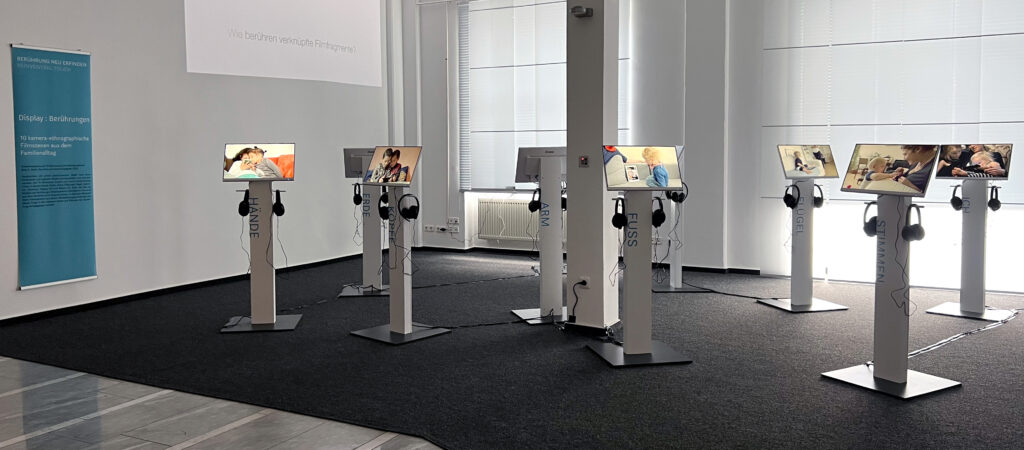
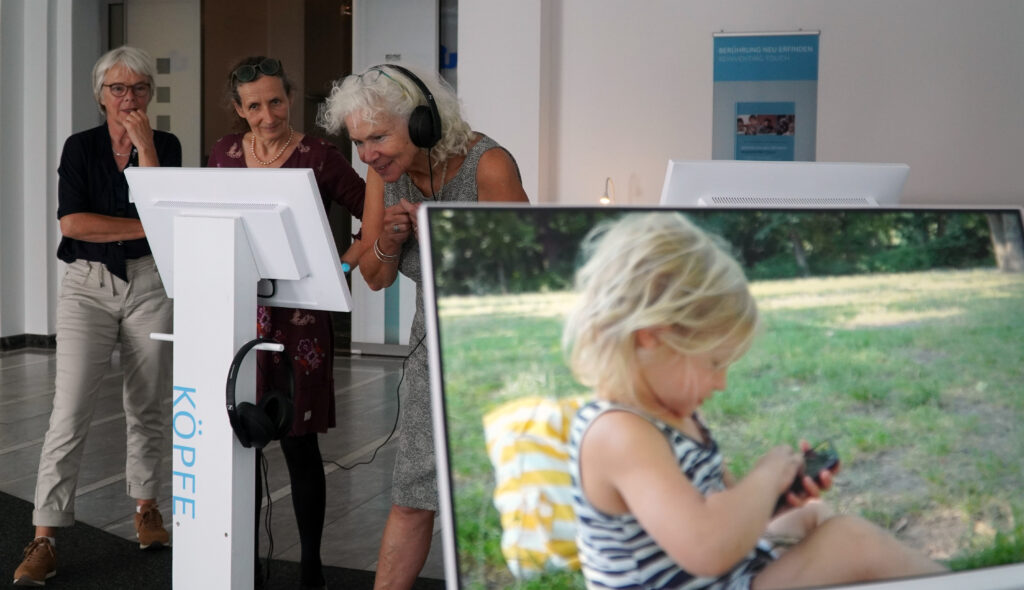
With Annika Gruhn and her children. Photo: Pip Hare.
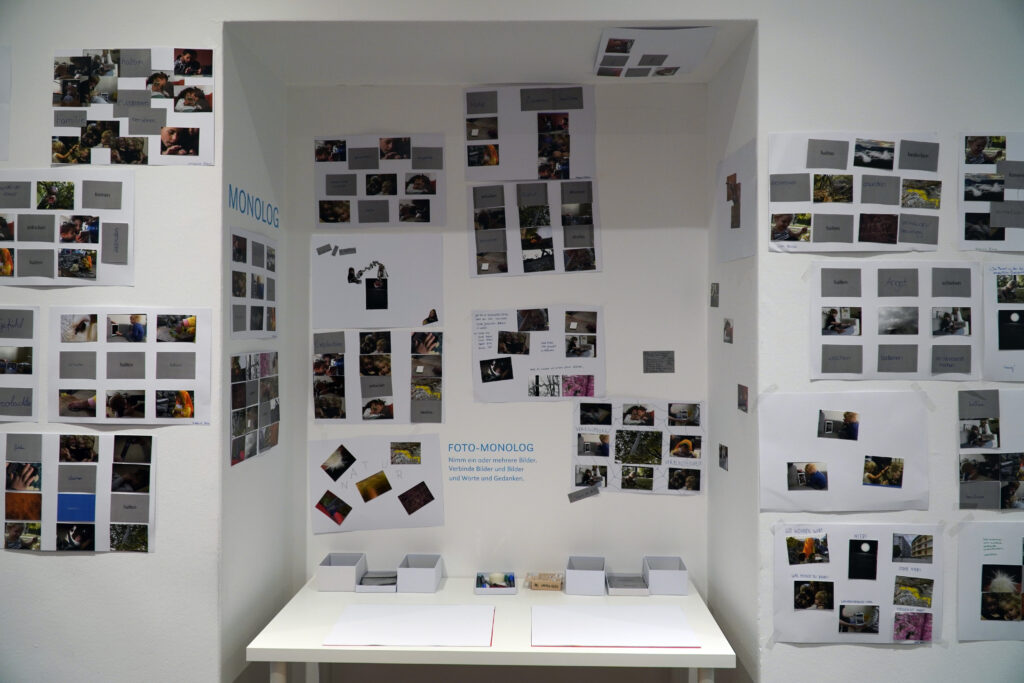
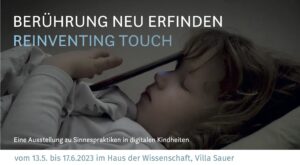
Die Ausstellung zu Sinnespraktiken in digitalen Kindheiten wird am 13. Mai 23 um 16 Uhr eröffnet
Was wird aus dem Berühren beim Zusammensein in digitalen Räumen? Geht das Berühren verloren, verändert es sich oder begibt sich auf Wanderschaft zwischen den Sinnen? Wird derzeit Berührung neu erfunden – in der frühen Kindheit und darüber hinaus? Um diese Fragen kreisen die audiovisuellen Exponate der Ausstellung, in denen Kinder Protagonist*innen ihres digitalen Alltags sind. Wir laden zur Teilnahme an einem kamera-ethnographischen Blicklabor ein, in dem Hände, Köpfe, Arme, Füße, Gesichter, Stimmen, Erde und Glas als Medien der Berührung in Displaywelten interagieren. Daran können Grenzverschiebungen dessen, was als Berührung zu bezeichnen wäre, beobachtet und erprobt werden.
Es handelt sich um eine Ausstellung des kamera-ethnographischen Film- und Forschungsteams Bina E. Mohn, Pip Hare und Astrid Vogelpohl, zusammen mit Jutta Wiesemann, Projektleiterin des Teilprojekts B05 “Frühe Kindheit und Smartphone” beim Sonderforschungsbereich 1187 “Medien der Kooperation”.
Öffnungszeiten: Donnerstag bis Samstag: 14 – 18 Uhr
sowie am Familientag (15. Mai 23) und am Digitaltag (16. Juni 2023)
Vernissage: Siegener Tag der offenen Uni, am 13.5.2023 ab 16:00
Ort: Haus der Wissenschaft der Universität Siegen, Obergraben 23 (Villa Sauer), 57072 Siegen
This winter term, we have two lecture series at the CRC 1187 “Media of Cooperation” dealing both with the political dimensions of research.
The first lecture series addresses “Politics of Data – Politics of Semi-Autonomy”. Our invited guests will discuss concepts that critically address the ongoing crises of the digital age (e.g. information, climate, resources, discrimination), e.g. Aesthetics & Evidence, Critique and Imagineries, (Data) Governance and Activism, (Interactive/value-sensitive) Design and Decolonialism. Even though all of these concepts deserve a lecture series on their own, we chose to have for each of these topics one lecture in order to create a kaleidoscopic and interdisciplinary perspective on what critical practices and future “Politics of Data and Semi-Autonomy” can look like.
The lecture series “Politics of Data – Politics of Semi-Autonomy” takes place as a hybrid event Wednesday from 2 to 4 pm c.t.. You can join online by registering here. Lectures:
23|11|22 – Investigative Aesthetics with Matthew Fuller
7|12|22 – Sensing Machines with Chris Salter
18|1|23 – Politics of Data – Politics of Semi-Autonomy with Orit Halpern
31|1|23 – Hacking into Aesthetics and Politics of (AI-)Avatarization and algorithmic facialitiy with
In view of the current political situation, especially the war in Ukraine and the protest movement in Iran, the second lecture series “Research at Risk!” is an invitation to discuss the challenges of research in media, theater and cultural studies in crises and war regions beyond national and cultural boundaries. How can research, education and studies be carried out under hostile conditions and what influence do war, political oppression, diaspora and other crisis-related impacts have on the production of knowledge? We invited experts from various disciplinary and geo-political situations/positions to discuss research practices in war and crises as well as on scientific/activist work on war and crises.
This lecture series is a continuation of an initiative from within German Media Studies to support scholars at risk affected by the ongoing Russian invasion on Ukraine and a cooperation between the CRC 1187 “Media of Cooperation”, the CRC 1472 “Transformationen des Populären“ and the Media Studies department at the University of Siegen, the Graduiertenkolleg 2132 “Das Dokumentarische” and the Faculty for Philology at Ruhr University Bochum, and the European Media Studies at the University Flensburg. The lecture series is an online event. Guests are welcome to register via Mail ‘Send an E-mail’
Networking, workshops and coaching sessions: As part of equal opportunities service in the CRC we host and offer a variety of formats ranging from networking events, coaching sessions and workshops to a comeback of our “Gender & Diversity Lunch”.
In the past winter, we invited Dr. Claudia Neusüß with a thought-provoking workshop on “Career Development and Negotiation Techniques”, which was the result of a valuable cooperation with the Equal Opportunities Office. Our PhD candidates became part of the supportive “Online Coworking Community” initiated by Dr. Anna Maria Beck and benefitted from an inspiring writing workshop conducted by [schreibzentrum.berlin]. Furthermore, we provided our female members individual coaching sessions on career development.
We started into the summer with a talk and discussion round with Dr. Iuditha Balint, director of the “Fritz-Hüser-Institut für Literatur und Kultur der Arbeitswelt”, which became the kick-off event for this summer’s “Gender & Diversity Lunch” series, formely known as “Gender Lunch”. In the following month we welcomed Jun.-Prof. Dr. Cécile Stehrenberger and are looking forward to our next guests, Prof. Dr. Julia Bee and Dr. Simone Pfeifer, who will share their experiences around the topics of gender equality, diversity as well as reconciling academia and family. The “Gender & Diversity Lunch” is a collaborative format with the CRC 1472 “Transformations of the Popular”. Joining forces, we seek to facilitate networking between CRC members and individuals from variuous fields with different biographical backgrounds.
In June, we were very happy to host the workshop “Critical Whitness – Perspectives and Positioning for Everyday University Life” facilitated by KARFI – Black Collective for Empowerment and Racism-Critical Education. The educational collective is an association of three Black women, offering workshops, lectures, and support on working critically on racism.
We are very much looking forward to learning and growing with, through and from one another.
You find more about our Equal Opportunities Services here.
2 / 4
